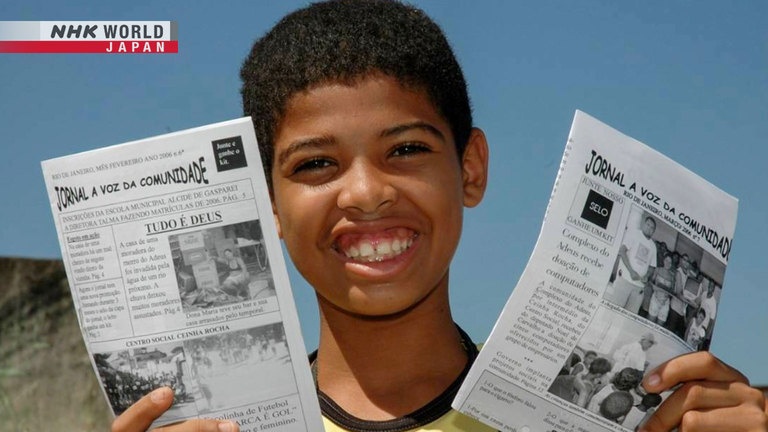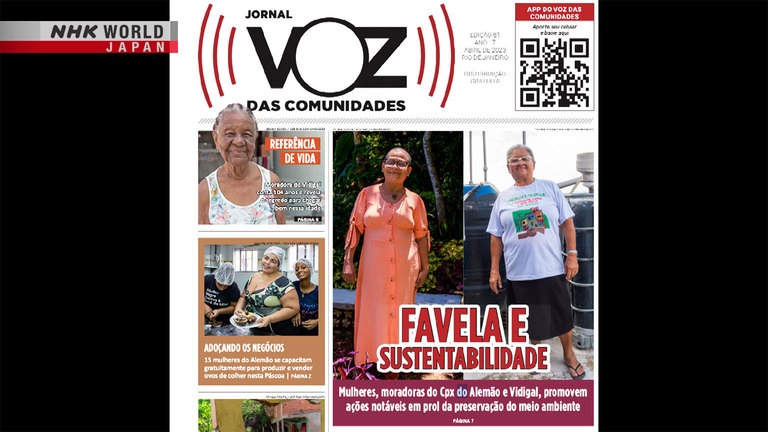Power of the Voices: Rene Silva dos Santos / Founder of Voz das Comunidades
Rene Silva dos Santos, a favela native, began the paper "Voz das Comunidades" at 11, sharing local views. He tells us how he underscores the crucial role of disseminating information from the favelas.


Transcript
Direct Talk
Today's guest is Rene Silva dos Santos.
He publishes his own
community-based newspaper in Brazil.
His country is known for having
a strong disparity between the rich and poor.
Slums called favelas are scattered
around major cities.
These favelas have an image
of being high crime areas.
Rene was born and raised in one of them.
He published a newspaper when he was only 11
to convey a true picture of where he lived.
He continues to write about the unique
aspects of life and culture in the favelas,
as well as problems that one understands
from a resident's perspective.
Rene was selected as
one of 30 under 30 by Forbes
and the next generation leaders
by Time Magazine.
He helps express the voices of minorities
both in and outside of the favelas
through his journalism
and speaks to the world.
Power of the Voices
Brazil is a dazzling,
sunny South American country.
However, the area
surrounding its major cities
is home to numerous "favelas," or slums.
They are said to be centers
of many criminal organizations.
In October 2023,
the police raided the Mare favela
in the northern district of Rio de Janeiro.
They conducted a mafia cleanup operation.
Rene continued his publication
during this turmoil to inform people
which hospitals and supermarkets were open,
in addition to other important
information and news
needed by the residents in the favela.
Our goal this time was to show the residents
what was happening in the favela,
how the operation was conducted,
and what impact
it was having inside the area.
In general,
the major media, focuses heavily on
the seizure of drugs, weapons, and arrests,
but do not report on the
more human side of the story.
Our newspaper tries to report
information that people need.
For example,
we talk about when public clinics are closed
and if they are no longer functioning.
People need to know
if they can leave their homes
whether they can go to the public clinic,
if they can go to the bakery
or if the supermarket, buses,
and bike services in the community
are functioning.
Rene Santos was born in Rio de Janeiro in 1994.
His father was a cleaner
and his mother ran a sewing business.
He grew up in the favela.
Supporting each other is an
important part of the favela culture.
Solidarity plays a big role.
We often help each other
for example,
if you need medicine or food,
and if you don't have it,
your neighbors will provide it for you.
A barbecue called churrasco
is often done on a rooftop.
It's usually prepared
when there's a soccer game.
Everyone joins and stops what they're doing.
Soccer match days are not the only time.
When it's someone's birthday for instance,
we have churrasco!
Rene says he was familiar with
newspapers from an early age.
My family has a longstanding tradition
of reading a newspaper,
and it was my grandfather
who had the greatest impact
on instilling this habit in me.
He used to buy the papers,
especially the Sunday edition,
because it was thick
with substantial content.
He would spend a week reading it.
As a result, I developed the habit
of reading newspapers in my childhood,
and it has persisted until adolescence.
When you're young,
you want to read about everything.
But when the favelas were mentioned
in the major newspapers,
it was always about the violence
about drug cartels and deaths.
It was always about
the bad side of the neighborhood.
I was angry about this.
I felt sad that the favela was
only reported in a negative way.
I wanted to see the positive aspects
of the favela in the newspapers.
Rene entered elementary school
which had a newspaper club.
He wanted to write his own articles
and joined the group.
I remember my first article
in the school newspaper
was about a problem we had in the classes.
It was about the lack of teaching materials.
There were no books, there were no notebooks,
there were no materials
for students to study.
So when the students wrote about the problem,
I remember it caught the attention of the
Rio de Janeiro Department of Education.
They read the newspaper article
and solved the problem faster than normal
even before the principals
and teachers could complain!
Weeks after the publication,
books, notebooks, pencils, pens,
and other educational materials
started to arrive at the school!
Rene discovered the power of newspapers.
He decided to create a paper for the favelas
after this successful experience.
I began to feel that I could help
change the reality of my favela
through publishing a newspaper.
I thought I could show people
who don't live in the favela
what's it really like inside
through this media.
In 2005, at the age of 11,
Rene created a four-page newspaper
using the school's copy machine
and with the help of his teachers.
The name was "Voz das Comunidades,"
meaning "Voice of the Community."
100 copies were printed and distributed
free of charge to favela residents.
I remember in this first edition
of the newspaper.
I published about the problems
on the front street outside my house.
There were many potholes,
and it was a problem for trucks and cars.
A few weeks after the article was out,
there was a speedy response.
The government took action by
paving asphalt on the streets of the favela.
Despite the difficulties in raising funds,
Rene was able to get a few friends and
continue with his newspaper for the favelas.
In 2010, his paper had an opportunity
to dramatically increase its readership.
The military and police conducted a cleanup
operation of a favela near where Rene lives.
At this time,
Rene took to "X", formerly Twitter
telling where the shooting was taking place.
He told people to return home
to avoid dangerous stray bullets.
He informed others where
the electricity and water were working.
He posted on X when schools were open among
other information useful for local residents.
His posts attracted a lot of attention.
I remember that within about 30 minutes,
10,000 people started following me.
Everyone wanted to know
what was going on inside the favela.
People watched TV, but they had no idea
what was really going on inside.
They were wondering
what the people living there were feeling
under the circumstances among other things.
This put Voz das Comunidades
in the spotlight.
Donations poured in, and the newspaper grew
to a circulation of about 15,000 monthly copies.
Over 100 volunteers, including journalists,
columnists, and delivery personnel,
rallied to support Rene's objectives
and took charge of
overseeing the paper's operations.
The paper was distributed free of charge
to the people living in the favelas.
Today, one of the most popular columns
in Voz das Comunidades is "FACTS or LIES ,"
which examines the rumors in the favelas.
For example, they reported it's true
that a new heat wave was coming to Brazil.
And it's not true that the Brazilian
government embezzled 1,200 reals in aid
that was for poor families, and so on.
During the pandemic, I noticed
an overwhelming increase in fake news.
People were spreading inaccurate news
on social networking sites.
I started thinking about what we could do.
So we created a section
called "FACTS or LIES."
We wanted to make it easy for people
to understand what is true
what is real, and what is a lie.
Voz das Comunidades for me is a communication
medium that democratizes information.
It allows people living inside the favelas
to know what's happening inside
the places where they live.
And it allows people
outside the favelas to also know
what's really going on
rather than news by major media.
It has been almost 20 years
since Voz das Comunidades began.
Young journalists, inspired by Rene's vision,
harness the power of the internet
to disseminate news from the favelas.
For instance, they produce
news covering students
grappling with a malfunctioning
air conditioning system at the university
or highlight the stagnation
of a road construction project,
causing inconvenience to the residents.
With the construction,
it's necessary to leave home an hour earlier.
Voz das Comunidades remains committed to
sharing the perspectives of favela residents.
Voz das Comunidades is
expanding significantly,
and Rene now harbors an even bigger dream.
We have plans to expand
such a newspaper in the near future,
not only in Brazil,
but also to the African continent
and other Latin American countries.
I have already visited Colombia,
and found something similar
to the favelas of Rio de Janeiro.
I hold the belief that
communication possesses immense power,
and this influence is
crucial in every location
where people endure
challenging living conditions.
Rene is of the conviction that,
amidst the ongoing conflicts worldwide,
there is a pressing need for a platform
to convey the voices of people
in socially vulnerable positions.
If there were newspapers like
Voz das Comunidades all over the world,
I think the world would change.
For example,
there would be international correspondents
in many parts of the globe.
We would have a much broader perspective
on the realities of the disadvantaged.
Just by looking at the war
between Ukraine and Russia,
and more recently between
Hamas and the Israeli government
we see mainly disadvantaged people
being affected in all these cases.
However, the war is not being reported
through various perspectives.
It's only reported
from a single point of view.
In other words,
we are being informed by government officials
or by public relations officers.
There is no information coming from
the Palestinian people
who are directly affected by the war
as the internet has been shut down.
So we don't know the actual situation.
But these disadvantaged people
are the ones who need to speak up.
The world needs to hear this.
I am able to freely post my thoughts today.
My dream is for everyone in the world to
be able to voice their opinion in this way.
We ask Rene his favorite word.
Altruism
Altruism,
the act of stepping into the shoes of others,
defines what we do
helping without expecting anything in return.
This sums up our approach.
To put ourselves in another person's shoes
is to relate with others
gaining a firsthand understanding
of the situation they are in.
And actually feel
what they are going through.